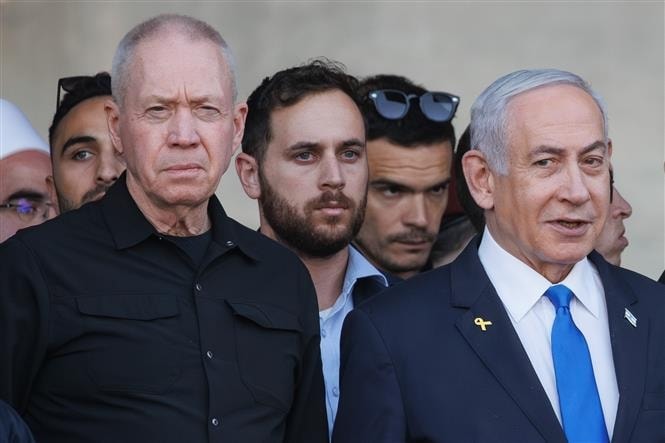The ICC has issued an arrest warrant for Israeli Prime Minister Benjamin Netanyahu on charges of war crimes in the Palestinian territories, including Gaza.

The International Criminal Court (ICC) on November 21 issued arrest warrants for Israeli Prime Minister Benjamin Netanyahu and former Defense Minister Yoav Gallant on charges of war crimes in the Palestinian territories, including Gaza.
The arrest warrant marks a major development in efforts to hold Israel accountable for its genocide in Gaza, now in its second year, and the escalation of violence in the occupied West Bank.
The ICC said the arrest warrant relates to "crimes against humanity and war crimes committed at least between October 8, 2023 and May 20, 2024, when the Office of the Prosecutor submits the application for the arrest warrant."
The ICC also unanimously rejected Israel's challenges to the court's jurisdiction under Articles 18 and 19 of the Rome Statute - the treaty that established the ICC.
Regarding the charges, the court said there was a “reasonable basis” to believe that Mr Netanyahu and Mr Gallant were criminally responsible as co-conspirators for the following acts: war crimes involving starvation as a method of warfare; crimes against humanity including murder, persecution and other inhumane acts.
The ICC also issued an arrest warrant for senior Hamas leader Mohammed Diab Ibrahim Al-Masri, also known as Deif. Israel claimed Deif was killed in an airstrike in Gaza in July, but Hamas has not confirmed this.
Legal implications for Prime Minister Netanyahu and Mr. Gallant
The arrest warrants, which would make Mr Netanyahu and Mr Gallant war criminals, are the first to target leaders of a Western allied country, experts say.
The ICC's declaration poses major challenges for both men, as the ICC's 124 member states are now obliged to arrest and extradite them if they set foot on their territory.
The list of countries includes some of Israel's closest allies in the West, which have provided weapons and diplomatic protection to Israel's violent actions against Palestinians, such as Britain, Canada, Australia, Germany, France, Belgium, Italy, the Netherlands and Norway.
Other European countries such as Spain, Switzerland, Denmark, Croatia, Czech Republic, Finland, Hungary, Portugal and Poland are also included.
Other major signatories to the Rome Statute include Greece, New Zealand, South Korea, Japan, South Africa, Nigeria, Mexico, Kenya, Colombia and Brazil.
The notable exception is the United States, which withdrew from the Rome Statute in 2002 and has no legal obligation to act against Netanyahu and Gallant.
However, the ICC stressed that while non-member states have no legal obligation, they are still “encouraged” to enforce arrest warrants, as the court has no direct enforcement mechanism.
Israel's allies will come under great pressure
Law professor Gerhard Kemp said the ICC's decision was remarkable in many respects and put great pressure on countries that had supported Israel despite international criticism of its genocide in Gaza.
"This decision reaffirms the ICC's jurisdiction over the situation in Palestine, rejects Israel's challenges, and makes important observations about the nature of the conflict, such as the application of international humanitarian law. It also underscores the weight of the evidence," Mr Kemp said.
Importantly, the ICC has maintained that an individual's official position is not a bar to the execution of an arrest warrant or trial in court, including for high-ranking officials such as the Israeli Prime Minister.
Similar to the cases of Omar Al-Bashir (Sudan) and President Vladimir Putin (Russia), this arrest warrant will create a major diplomatic and political challenge for ICC member states, especially in the West such as Germany and the UK, Mr. Kemp emphasized.
However, he also warned that ICC member states often face political difficulties in complying with their obligations, as seen in South Africa and Jordan (not arresting Al-Bashir) or more recently Mongolia (not arresting President Putin).
He predicted that European countries and traditional Israeli allies would soon come under great pressure to take a stand on whether they would enforce the warrant if given the chance.
In a related development, many European countries have said they will comply with the ICC's ruling. On November 21, when asked about an arrest warrant issued by the International Criminal Court (ICC) for senior Israeli officials, Canadian Prime Minister Justin Trudeau said his country would comply with any ruling by international courts. Meanwhile, Norwegian Foreign Minister Espen Barth Eide stated: "It is important that the ICC carries out its duties with due diligence. I am confident that the court will conduct the case based on the highest standards of fair trial."
Swedish Foreign Minister Maria Malmer Stenergard affirmed that Sweden and the EU support the important work of the court and protect its independence and integrity. She added that Swedish law enforcement agencies decided to arrest the subjects on Swedish territory based on the ICC ruling.
Turkish Foreign Minister Hakan Fidan called the ICC arrest warrant a "hopeful" and extremely important step in bringing Israeli authorities responsible for genocide against Palestinians to justice.
In addition, the Netherlands, Switzerland, Ireland, Italy and Spain all pledged to fulfil their commitments and obligations under the Rome Statute and international law.